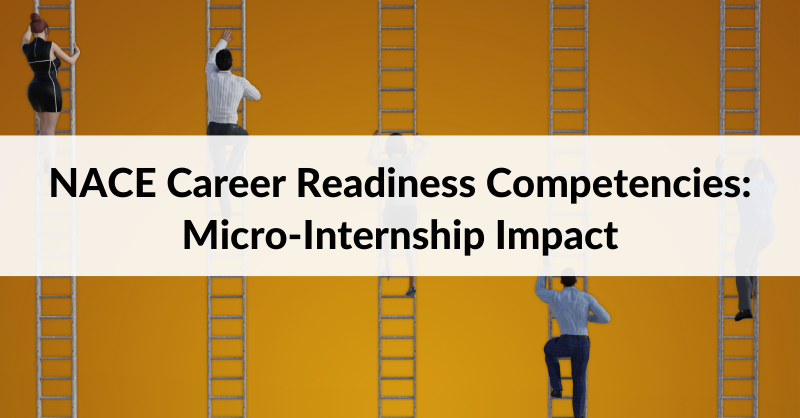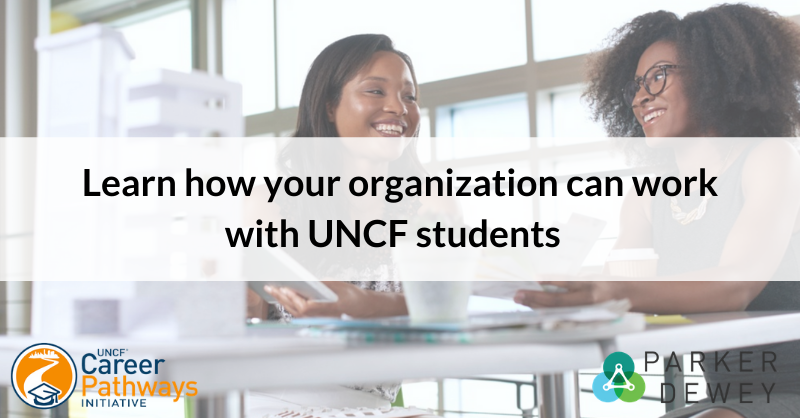
The Role of Micro-Internships in Enhancing NACE Career Readiness Competencies
When it comes to career services professionals, the National Association of Colleges and Employers (NACE) Career Readiness Competencies remain essential for understanding how various career development activities impact students. Over the years, programs have evaluated diverse experiential learning opportunities, such as on-campus positions, traditional internships, coops, student clubs & organizations and in class real world simulation projects. However, with the rapid changes in the workplace and evolving technology, how are Micro-Internships specifically impacting students' career readiness in 2025?
Parker Dewey has been gathering insights since 2022 from students and recent graduates that we aptly call Career Launchers, who have completed Micro-Internships. We have asked them to reflect on the impact these experiences have had on their career readiness, as outlined by NACE competencies. The chart below illustrates students' perceptions of how their Micro-Internships have helped them improve in key areas of career development.
Comprehensive Impact
As of January 2025, the data continues to reveal that even short-term Micro-Internships (typically 10–40 hours) have a significant impact on students' career readiness. 96% of Career Launchers reported improvement in at least one career competency, with nearly 90% indicating improvement in three or more competencies. Across all eight NACE Career Readiness Competencies, 45% of those who took our survey reported improvement in every competency.

Key Areas of Improvement
For Career Launchers looking to build skills related to Professionalism, Communication, Career & Self Development, Technology, and Critical Thinking in particular, the survey results indicate that Micro-Internships are a great opportunity. Considering solely improvement as opposed to a combination of improvement and confidence-building, three quarters or more of responses indicated that they improved skills related to these competencies. Considering the direct connection and communication Micro-Interns have with companies, these reports aren't surprising, nor are they insignificant in terms of the positive impact these professional skills will likely have in Micro-Interns' future workplaces.

The Importance of Confidence
In addition to skill development, Micro-Internships have proven to significantly boost students' confidence. Researchers have consistently shown that confidence is a key factor in career success, and these experiences are helping students build the self-assurance they need and overcome imposter syndrome. Over 99% of Career Launchers reported either improvement or increased confidence in one or more competencies. In fact, confidence extends beyond traditional competencies and includes technical and industry-specific skills. Consider these reflections from recent Micro-Interns:
- "I learned adaptability to new software by experimenting, how to present my work, and how to explain what I did in my work."
- “I was able to increase my communication skills, interact with people at higher levels, and learn about the newest technology in the field.”
- “I got to really develop my critical thinking and approach to research…. it was a whole new aspect of the field of education and it was an awesome experience!”
This is especially important for students from underrepresented backgrounds, many of whom experience imposter syndrome. Research shows that Micro-Internships are a valuable tool for combating these feelings, offering them a safe and structured environment to build the confidence needed to succeed.
Implications for Employers
Employers often face a mismatch between the skills they prioritize and students' actual competencies. NACE's 2025 Job Outlook survey identified that 64.8% of employers use skills based hiring.
They also found that after a year of reduced hiring, employers now plan to hire 7.3% more graduates from the Class of 2025 compared to the Class of 2024. This increase is primarily driven by a focus on succession planning and building strong talent pipelines. Additionally, over 60% of employers reported that their companies are growing.
When it comes to what employers are looking for on resumes, nearly 90% of employers in NACE’s Job Outlook 2025 survey highlighted problem-solving abilities as a key trait, while around 80% emphasized the importance of strong teamwork skills. Written communication, initiative, work ethic, and technical skills are also valued by at least 70% of employers. Feedback from Micro-Internship participants indicates notable improvements.
Micro-Internships also continue to be a key tool for employers seeking to tap into diverse talent pools and create brand awareness among students. Almost all Micro-Intern participants indicated that real, paid work experience is their preferred method for engaging with potential employers, and nearly all said they would recommend Parker Dewey to peers.
Employers have shared valuable insights regarding the benefits of Micro-Internships:
- “Micro-Internships are a great way to test out new talent before committing to a full-time hire.”
- “They give us the opportunity to work with emerging talent in a low-risk setting. It's like a trial run before we decide to bring someone on board.”
- “This is a win-win situation: students gain essential skills and experience, while employers benefit from cost-effective, high-quality project support.”
These insights underscore the value of Micro-Internships for employers looking to build a pipeline of skilled, confident early-career professionals who can bring fresh perspectives to their teams.
Conclusion
The continued success of Micro-Internships demonstrates their positive impact on students' career readiness. The NACE Career Readiness Competencies are a powerful tool for measuring growth, and the feedback from Career Launchers clearly highlights how these short-term experiences help students develop critical skills, build confidence, and gain industry exposure. For employers, Micro-Internships present a valuable opportunity to identify top talent, while students and recent graduates benefit from meaningful, paid work that prepares them for their future careers.
If your institution is not yet offering Micro-Internships, now is the time to consider how these experiences can help your students enhance their career readiness. To learn more about how Parker Dewey can support your campus, visit us today or join an upcoming informational webinar, see our FAQ and Universities Page.




